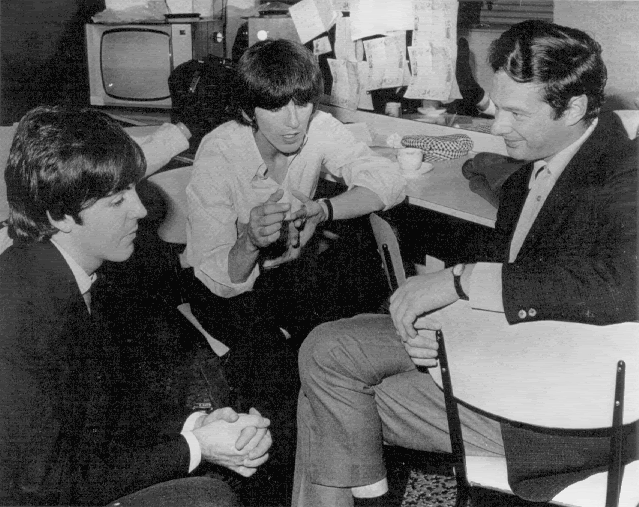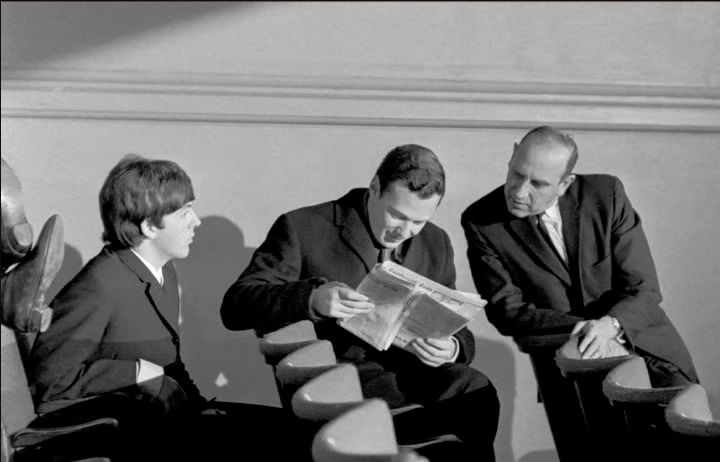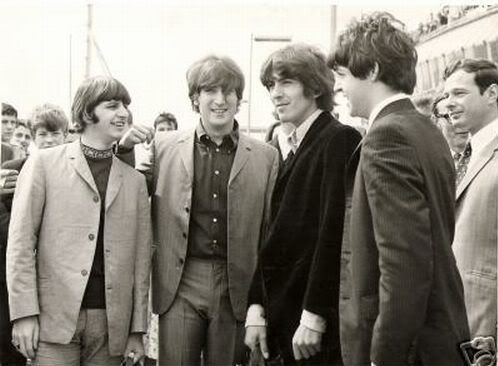Post by yerblues1968 on Jul 10, 2011 1:57:51 GMT -5

IAR EXCLUSIVE INTERVIEW: PRODUCER VIVEK TIWARY TALKS The Fifth Beatle
iamrogue.com
Written by Dana Feldman
Friday, 08 July 2011 12:09
Paul McCartney once said, "If anyone was The Fifth Beatle, it was Brian." He was referring to Brian Epstein, the
legendary manager of The Beatles. Epstein has been credited with their discovery as well as their success.
Broadway Theatre Producer Vivek Tiwary has secured $25 million in financing for his much-anticipated and long-awaited foray into film entitled THE FIFTH BEATLE. A story ripe to be told, the film will be centered on the Fab Four’s manager, a closeted homosexual in the days when being so was illegal in the UK. The film will focus on how Epstein suffered with his outsider status and dealt with his pain all while The Beatles became world famous.
Epstein managed The Beatles from 1961 to 1967 when he died at the young age of thirty-two of a sedative overdose. Ironically, he died just one month after homosexuality was legalized. Per Tiwary, “It’s definitely possible that You’ve Got to Hide Your Love Away is about Epstein’s struggles.” Though this suspicion has never been officially proven, it has been speculated among the many facets of him that to this day remain a mystery.
In the background of what seemed to be this happy world of The Beatles was a man described as deeply repressed and unhappy, who was fighting his many personal demons while bringing to the world the legacy of The Beatles.
Epstein dared to say things that at the time were considered ludicrous. One such quote, The Beatles are going to be bigger than Elvis. His beliefs were considered outrageous. He felt that The Beatles, as song writers, would elevate the medium of pop music to be considered as a real art form and he believed that they would someday be world famous and go down in history with the greats.
Busy as is with two successful Broadway musical ventures, The Addams Family starring Brooke Shields, as well as the Tony-Award winning American Idiot based on the multi-platinum, Grammy-winning album by rockers Green Day, Tiwary has a full-plate and an established solid footing in the world of entertainment.
Nashville’s DIMI Entertainment committed $25 million in funding for the project. After lengthy negotiations Tiwary gained approval from the band’s Apple Corps as well as a deal with Sony/ATV, which controls the Lennon/McCartney catalog.
Beatles’ holding company, Apple Corps, CEO, Jeff Jones, has confirmed that the film will not include any of the band’s original master recordings. Other than the 2010 film about John Lennon, Nowhere Boy, films about The Beatles featuring the four as characters (Backbeat, The Hours and Times, and Two of Us) were not able to secure such rights to the music and have gone without the usage of John Lennon or Paul McCartney music.

I recently had the opportunity to speak with Vivek Tiwary in regards to his amazing progress with this project and this is what he had to say about doing what had not been done before.
Dana Feldman: How were you able to obtain the rights to use Beatles songs in a film about them when no one has been able to secure such rights prior?
Vivek Tiwary: There isn’t really an easy answer. It took two-and-a-half years to get the music rights, but I just didn’t give up. I have a solid history of getting projects off the ground and I have never lost money on a theater project. But most importantly, I knew that my heart was in the right place and I knew that I would tell the story in a way that all of the decision-makers would be comfortable with.
So, this is a done-deal and all appropriate papers have been signed?
Tiwary: Yes. I have signed and fully-executed a deal with Sony/ATV, who control the Lennon/McCartney music catalog.
How many and what songs do you have the rights to?
Tiwary: I approximate the usage of six to ten songs. We have the ironclad rights to use the following twelve songs, with the option to swap out later for other songs if we decide to change the list: Help!, You Never Give Me Your Money, Girl, You’ve Got To Hide Your Love Away, All You Need Is Love, A Day In The Life, A Hard Day’s Night, Sgt. Pepper’s Lonely Hearts Club Band, Yesterday, Strawberry Fields Forever, Eleanor Rigby and Come Together.
I have read that the only film to ever use a Beatles song was the 2010 biopic Nowhere Boy. Is this true?
Tiwary: The song Hello Little Girl, which was believed to have been the first song Lennon ever wrote, was used in the film. This song was later credited to the Lennon/McCartney catalogue, but The Beatles never recorded it, nor was it on any Beatles album other than an anthology record.
When do you plan to start shooting?
Tiwary: My goal for the start of principal photography is somewhere in early 2012. However, we have some A-List director interest so we are being flexible with our schedule, within reason, to accommodate whomever we bring on board to direct. We have flexibility in financing with a commitment from Nashville’s DIMI Entertainment to back the $25 million budget. We want to make sure we bring the right person on board to direct.
Now that you have a fully funded film with exclusive music rights on your hands, excitement over the project has grown. But, I know that this has been a very long process in the making.
Tiwary: Yes, but I was determined to not give up. I have been working on developing this film for the past five years. My Grandfather once told me to work for myself and do what I love so I started my own entertainment company so that I could work on a passion project such as this if I wanted to.
So, let’s go back to the very beginning of your career. What was the very first step in your journey that you feel led you to where you are now?
Tiwary: I got my start in managing bands, actually. At the time it made perfect sense for me to study the manager of one of the greatest bands of all time, The Beatles. Brian Epstein was that man. He, along with the band, wrote and re-wrote the rules for the music business. So, I of course, wanted to learn anything and everything about him. He is credited for getting The Beatles their first record deal, as well as for managing the band. All of my research led me to this project.
Where do you think you will film it?
Tiwary: The script calls for three key locales, which are the UK, including London and Liverpool, and New York. But, we will film in places where it makes sense from a business standpoint. There is a great Northern fund if we film in Liverpool. There are places in Eastern Europe we can use that will have a great authentic feel for Liverpool as well as places in Canada that we can use for the UK.
Have you started casting the film yet?
Tiwary: We will begin the process once we have a director on board.

This project is obviously a labor of love for you. You’ve been in development for over five years, you wrote the script yourself, and you secured funding as well as music rights for the film. Did you ever reach out to Paul McCartney or Ringo Starr in an effort to get their approval?
Tiwary: Yes, I did reach out to both of them as well as the estates for George Harrison and John Lennon. I was not asking for anything from them, just letting them know about the project I was working on. I sent them all letters to let them know what I was doing.
In reality, you did not have to do this, as one need not ask for permission to make a film about a public figure.
So, was this just to be gracious?
Tiwary: I just wanted to make them aware, to do the right thing. And, they all responded and wished me luck!
(Sources say that while the Beatles are not officially endorsing the project, that they have signed off on the script paving the way for Tiwary to secure the music rights from Apple Corps.)
What is your ultimate goal with this film?
Tiwary: My goal is to make a human-interest film. If we do our job properly, this will not just be a film that will only appeal to Beatles fans. It will be less a music bio and more of an inspirational human-interest story about an outsider. I see it as closer to a Rocky than a Ray or Walk the Line. As the ultimate outsider in his chosen field, Jewish during a time of anti-Semitism, and gay in a time and place where it was literally a felony to be so, Brian Epstein had what most would rightfully consider insurmountable obstacles in his path. And yet, in his short life, he discovered and brought to the world one of the most influential bands in history. His life story serves as an inspiration to anyone who has ever been told that they couldn’t do something.
www.iamrogue.com/news/interviews/item/4175-iar-exclusive-interview-producer-vivek-tiwary-talks-the-fifth-beatle.html
